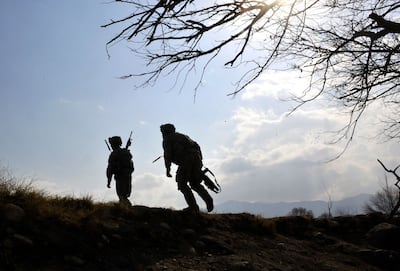President Barack Obama was not given the full picture over the risks of a major troop surge in Afghanistan, a former top American army chief has admitted.
Gen Stanley McChrystal said while he pushed for the former US president to agree to an additional 30,000 soldiers to tackle the Taliban insurgency, the chances of failure were high but he did not tell him “you [Obama] need to know that”.
The officer was speaking at the launch of his new book Risk: A User’s Guide, when he also mentioned his concerns that Nato did not have the resilience to deter Russian aggression and that cyber attacks could cripple society.
Gen McChrystal gave an honest insight into the risk-taking behind the Afghanistan surge that, similar to the Iraq campaign, it hoped would stabilise the country enough for troops to leave.
The officer, who has significant special forces experience, was sent into the country in 2009 to shake up the military approach and after a few months argued hard for an additional 30,000 soldiers, taking US numbers to more than 80,000.
The commander told Mr Obama that the surge had a good chance of success but on reflection he did not think the risks were “communicated as effectively as I could have”.
“I told him what I thought the dangers were but I probably should have been more effective and said ‘listen, this is a very high-risk endeavour, there is as much chance of this not working as there is of it working. I'm prepared to do our best but you need to know that’.”

Gen McChrystal, 67, said the problem was that once military commanders were ordered on a mission their thinking became “I have to do this, I will do this” and that did not communicate well to decision makers.
The subsequent surge in 2010 led to a doubling in US combat fatalities yet did achieve some success in pushing the Taliban back, creating breathing space to develop Afghan security forces.
But ultimately the American mission failed in Afghanistan with the Taliban’s total victory last August.
Asked if Nato was prepared to fight a limited non-nuclear war in Eastern Europe against a Russian invasion, the general suggested the alliance might not strongly oppose aggression.
“I worry that Nato is not focused enough on showing that resolve, but I hope that we will,” he told the event, hosted by Rusi, the London think tank.
Instead he believed that people would want to “make some accommodation with him” referring to another potential land-grab by President Vladimir Putin.
He also highlighted the growing risk to the “interconnectedness of society” from a debilitating cyber attack.
“I don't think we fully appreciate the vulnerability we have,” he said, when states and criminals move on to the “interdiction of banking, interdiction of electricity, the internet of things”.
“Those things would be such interruptions to our economic and defence activities that they would be the equivalent of kinetic war.”
He also criticised America’s approach to the Covid-19 pandemic, arguing that it was the best prepared country in the world to deal with the outbreak but had still suffered 750,000 deaths.
“We allowed our society to be tied into knots when we allowed it to become a political issue, all the while we were watching Americans die who didn't need to die,” he said.


